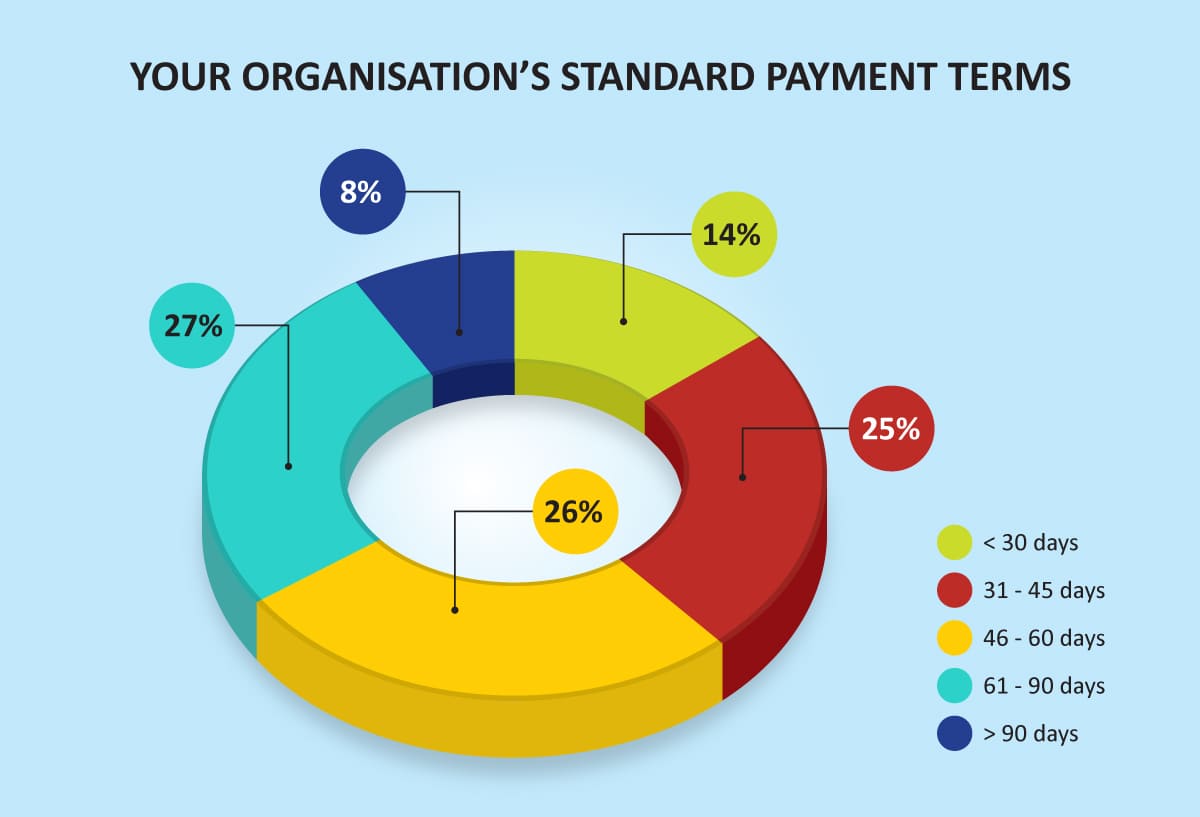
Accounts Payable automation underpins the success of Payment Terms


In collaboration with Nandhini Dhabathy, Lead Analyst -- Procurement and Finance Business Services
Procurement departments in any large organization, in partnership with the accounts payables team, can develop an efficient working capital structure for the company.
An efficient working capital management, of which payment terms are an important ingredient, should not only ensure timely payment of invoices but should also have the potential to reduce the company’s credit costs.
Working capital management has been considered one of the top five priorities of CFOs every year. It plays a key role in determining the solvency of a firm, maintaining goodwill, and ensuring smooth business operations.
A working capital management system ensures the right balance of inventories and cash in the business. Optimizing working capital helps companies by improving their cash flow and reducing their inventory and capital costs.
In an ideal scenario, a supplier gets paid on invoices almost immediately -- but this almost never happens. A delay in customer payments or ad hoc extension of payment terms can be a frustrating experience for any supplier.
Efficient working capital management, hence, becomes crucial; however, it must be accomplished in a manner that does not stress the supply chain.
It is important for procurement organizations to manage payment terms that are beneficial to both business and suppliers. One way of determining the best payment terms is benchmarking it with the industry average.
We ran a poll among users of Beroe LiVE, a community of thousands of procurement decision makers, to find out their respective organization’s standard payment terms.
A slight majority – about 27 percent – responded that their payment terms are between 61 and 90 days. Overall, the consensus seems to be between 31 and 90 days.
Less than 8 percent of them responded that they pay their suppliers only after 90 days.

In fact, best-in-class companies perform better than their peers on the metric: Payables as percentage of sales.
Payment terms can also be used as a negotiation lever, if the category manager knows the industry average. For example, travel management companies (TMCs) usually bill every fortnight and they expect payment to be done within the next fortnight. Knowing this benchmark can help a sourcing manager establish optimal payment terms.
For better implementation of payment terms, procurement departments need the cooperation of the accounts payables team. Therefore, accounts payables automation is very crucial.
Accounts Payables (AP) Automation
AP automation refers to the deployment of a single system that can process all invoices through a structured workflow with automated matching and built-in approval logic.
AP automation can be achieved by automating five key tasks performed by AP departments.
Invoice Capturing: Invoices in various formats, such as paper, email, fax, PDF, EDI, and XML, can be automatically captured in the system and processed. Automated checks to detect duplicate invoices, missing purchase order (PO) numbers, and unregistered vendors at source can also be deployed. AP departments will only need to handle exceptions.
PO Matching: Automated two/three way matching of POs, invoices, and goods received notes eliminates manual paper-based processing.
Approval Automation: Invoices can also be routed electronically for approval. Rules based on roles, hierarchies, product types, and varying approval limits can be configured to reduce approval time and control costs.
Integration with ERP: Interoperability between AP and ERP systems can ensure full visibility of the end-to-end AP process, along with a complete audit trail for every reason.
Analytics: KPI dashboards and reports can also be generated to enable monitoring of AP processes.

AP Automation Implementation
Options for the implementation of AP automation solution include on-premise installation and a cloud option; you can also select between lease or purchase options.
Sourcing Options
For a typical large organization, which handles more than 5,000 invoices per month, the cost of implementing an automated AP solution and switching over to e-payables can cost between $14,500 and $20,000. A SaaS AP Automation system, the cheapest option available, may cost between $0.95 and $1.40 plus GST per invoice and minimal implementation costs.
Automated Data Capture:
• Fully automated server-based Optical Character Recognition (OCR) solution: $900 - $13,000
• Overall OCR validation (including costs of FTE required for error-rate handling): $30,000 - $60,000 (depending on the number of invoices)
AP Automation Software
• Implementation and training: $5,000 - $30,000 (depending on the level of automation)
- Accounting software integration: $750+
- E-payment: $1.25 per payment
- E-payment set-up: $2,500+
- Software licensing fee: $40,000 - $60,000
Document Scanning
- Automated document scanning: $70,000 - $80,000
Benefits Benchmarking
Despite the high costs of implementation, organizations can achieve significant benefits in terms of shorter processing cycles, lesser errors/exceptions, and lesser cost per invoice.
|
Metrics |
Automated AP |
All Others - Industry |
|
Cost to process a single invoice (all-inclusive) |
$2.94 |
$15.96 |
|
Time to process a single invoice |
3.6 days |
16.6 days |
|
Invoice exception rate |
9.8% |
19.1% |
|
% of invoices processed “straight-through” |
54.1% |
17.3% |
|
% of suppliers who submit invoices electronically |
44.0% |
12.3% |
|
% of invoices linked to a purchase order (PO) |
73.1% |
54.5% |
Table: Automated AP and Digital Payments Vs Industry Average
Please note that price indicated for Automated Data Capture, Document Scanning and AP Automation Software are “per annum” prices.
Prices indicated are for large corporates. Smaller firms will spend much less. For example: Cost for automatic data capture can be as low as $500 to $1,000 per annum for small firms.
Related Insights:
View All
Get more stories like this
Subscirbe for more news,updates and insights from Beroe






